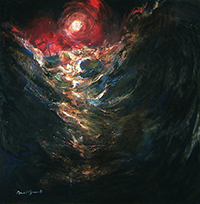by Arthur Paul Patterson
THE STORY OF the disciples in the boat with Jesus in Luke 8:22-25 is another kind of storm story; it comes bundled with a different set of lessons than those of Paul's shipwreck from Acts 27. Many of the features, however, are familiar.
The characters are together in a boat. They have a destination in mind. A storm sweeps down on them. They are in danger of being swamped by water. The storm mirrors the emotional upheaval and panic of the crew. All navigational powers are lost.
In the Gospel's story, there is no implication that the journey is an intrinsically foolhardy one. There is an acknowledgment the boats are made for water and travel — for risk-taking. Boats are built to answer the call of distant ports. There is no clinging to "Fair Haven" here.
The primary difference between Paul's shipwreck and the disciple's encounter with the squall is the calming presence of Jesus. Unlike Paul, Jesus has no hesitation in taking the journey. He is at peace and confident to such an extent that he falls asleep in the boat. Usually falling asleep symbolically means falling into unconsciousness; however, in this instance Jesus' sleep represents utter trust and reliance on God.

Painting used with permission from Daniel Bonnell
From a literal point of view, the message behind this tale is that Jesus commands the forces of nature. He is a miracle worker. While this may be debated, there is nothing untrue about the fact that Jesus' presence and example altered reality at a very fundamental level. He alters the external circumstances because he believes in God's providence. Nothing in the storm is outside of God's purview; Jesus trusts God.
The crisis over, Jesus asks his friends, "Where is your faith?" The blatant answer is that it was swamped by a sudden squall. The question behind the question, however, is "How does Jesus arrive at his faith, faith enough to fall asleep in the midst of the storm?" Jesus' tranquility-creating faith, stemmed from trust. His was faith akin to that of an utterly trusting child casting their security upon a sovereign and trustable God. Behind, beneath, and around the storm is a more powerful phenomena - God's accompaniment.
Moral Level
Just when I was convincing myself of the durability of the "Fair Haven" principle using Paul's story, I bumped into this reading that stretched me in a completely different direction. Staying safe at home is something I probably do not have to be told, as much as I need to hear Jesus telling me to venture out in confidence even when it looks ominous. Jesus is asking me directly, "Will you go sailing? Will you take up the vehicle of life and go on a journey? Will you trust God to be there in this squall?"
Spiritual Level
Far fewer times than I would like, I have experienced trusting sleep while the storm rages around me. Sleeping that trusting slumber of a child of God has been the most peaceful thing I have ever experienced. The greater the turbulence of the storm is, the more amazing the quality of the trust. It only comes by union with Christ, his peace that passes rationality and understanding; it is brought about through the Spirit. God, not squalls, determines my life. Hostile crowds, Roman authorities, and fickle friends did not determine Christ's faith or his actions - he knew that God was loyal when for all the world it looked like he was being betrayed even by his Father.

Permission pending from David van Hulse.
